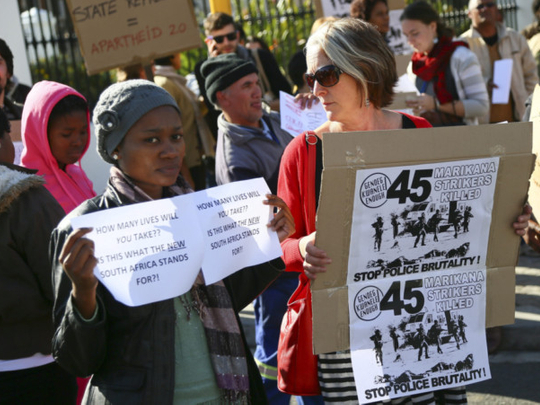
Marikana, South Africa: South Africa’s police watchdog Saturday was sifting through evidence from the police killings of 34 workers at a platinum mine, as the nation tried to piece together the causes of the tragedy.
The police have greatly reduced their presence at Lonmin’s Marikana platinum mine, with a half dozen armoured vehicles stationed near the scene of the killings and a helicopter circling overhead.
Since Wednesday, more than 1,000 mine workers gathered outside a shantytown near the mine, some wrapped in blankets against the winter cold, carrying metal and wooden sticks.
Relatives of victims trickled into the mine’s hospital, where a caravan was set up outside to provide information on the dead and wounded. Hospital security kept journalists from entering, appealing for privacy for the families.
The Independent Police Investigative Directorate has already opened what is likely to be lengthy probe into the deaths at the mine, in addition to a national commission of inquiry announced by President Jacob Zuma.
“There’s various investigations, there’s a lot of experts involved, it will take some time,” police spokesman Dennis Adriao told AFP.
“The national commissioner did mention that we will give our full cooperation with any of the investigations into the very, very sad, tragic event.”
The directorate said in a statement that their probe would determine whether police gave a “proportional” response by firing live rounds into a crowd of workers armed mainly with machetes, spears and clubs.
No violence has been reported since Thursday’s crackdown was captured on camera and broadcast to the nation.
Top union leaders urged workers to remain calm, hoping to defuse the rivalry between two mine workers unions, whose clashes killed 10 people earlier in the week.
“Workers must calm down and allow leaders to address their issues,” Sidumo Dlamini, president of the powerful Cosatu trade federation, said on national radio.
“It doesn’t matter now which union you belong to, there is a crisis, let’s normalise and create a platform where people will be free to express themselves, people will be free to say their demands under a normal situation.”











